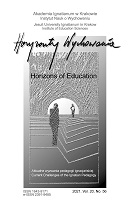Neuroróżnorodnodność studentów w uczelni wyższej w dyskursie kompensacyjno‑terapeutycznym i dyskursie otwierania potencjału. Część I
Neurodiversity of Higher Education Students in the Compensatory and Therapeutic Discourse and the Discourse of Unlocking Their Potential. Part I
Author(s): Ryszarda CierzniewskaSubject(s): Education, Higher Education , Health and medicine and law
Published by: Uniwersytet Ignatianum w Krakowie
Keywords: university education; students with the autism spectrum and Asperger’s syndrome; teacher beliefs; supporting students; education;
Summary/Abstract: RESEARCH OBJECTIVE: The aim of my research is an attempt to give meanings that are crucial for the preparation of an academic teacher to the didactic process which is conducive to unlocking potential of students with autism and Asperger’s Syndrome. PROBLEM AND RESEARCH METHODS: The research problems were defined in the following questions: How to prepare self for the didactic process to create opportunities for students with the autism spectrum disorder and Asperger’s Syndrome to develop their own potential? Do neurodiverse students need special compensatory and therapeutic support from an academic teacher? Hermeneutic approach is embedded in the constructivist paradigm relating to the didactic and social dimensions of creating an educational reality. THE PROCESS OF ARGUMENTATION: The article opens with the definition of categories related to autism and the description of the dynamics of the increase in the number of students with this diagnosis. Then, in the light of the collected research, the compensatory-therapeutic discourse and its importance for teachers’ beliefs were described. The last part is about giving meaning to the didactic process, the meaning of which is to unlock the students’ potential. RESEARCH RESULTS: Preparation for the didactic process of an academic teacher includes the need to learn about the phenomenon of autism, which is important for forming beliefs about the possibilities and needs of students with this diagnosis. Neurodiversity students within the intellectual norm and above do not need compensatory and therapeutic support from an academic teacher. This type of support is provided to students and teachers from university specialists for people with disabilities. CONCLUSIONS, INNOVATIONS AND RECOMMENDATIONS: In Poland, a narrow scope of research on neurodiverse students is observed. The medical approach to autism dominates, while there is the lack of pedagogical studies that strengthen academic teachers.
Journal: Horyzonty Wychowania
- Issue Year: 20/2021
- Issue No: 56
- Page Range: 119-132
- Page Count: 14
- Language: Polish

